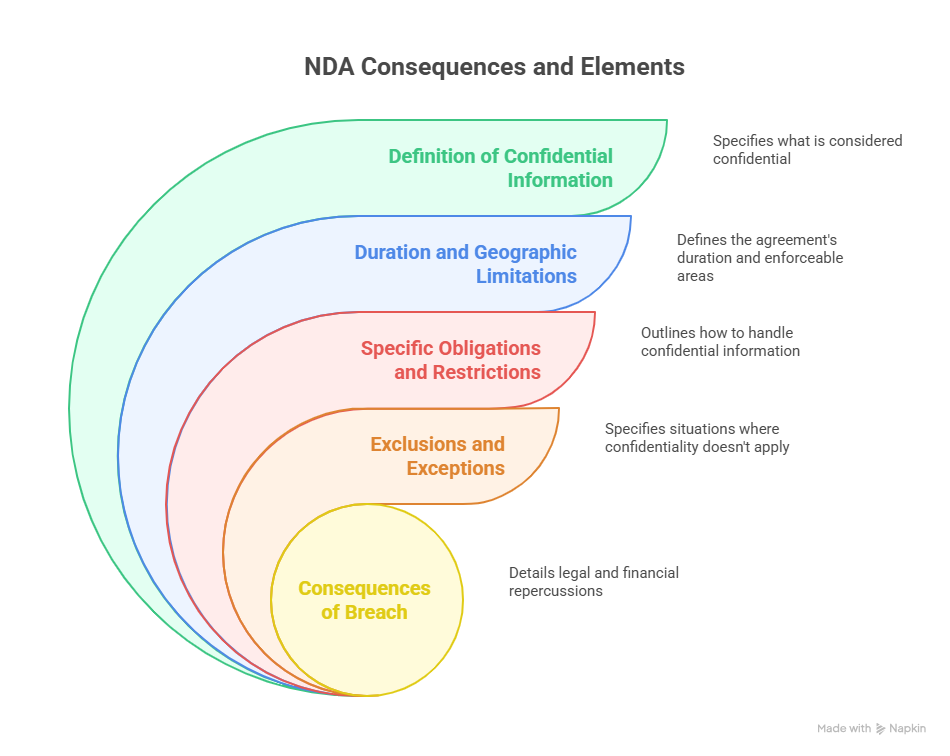Did you know that nearly 70% of businesses require their employees to sign a Non-Disclosure (NDA) at some point? This statistic highlights the prevalence of NDAs in today’s business world.
Companies like Google and Facebook frequently use NDAs to protect their sensitive information. But what exactly is an NDA, and why is it so important? An NDA is a legally binding contract that ensures confidentiality between parties.
Before signing an NDA, it’s crucial to understand its terms and implications. Consulting with an NDA attorney or a non-disclosure agreement lawyer can provide valuable insights and help you make informed decisions.
Understanding Non-Disclosure Agreements: The Basics
NDAs, or non-disclosure agreements, serve as a cornerstone in safeguarding sensitive information in various professional settings. At its core, an NDA is a legal contract between two or more parties that outlines confidential information that should not be shared with others.
What Is an NDA and When You’ll Encounter One
An NDA is typically encountered in situations where confidential information is being shared, such as during business negotiations, employment, or when discussing proprietary information. For instance, when a company is considering a merger or acquisition, both parties may sign an NDA to protect the sensitive details of the deal. Consulting with a confidentiality agreement attorney can provide insights into the necessity and implications of such agreements.
Common Types of NDAs: Unilateral vs. Mutual
NDAs can be categorized into two main types: unilateral and mutual. A unilateral NDA involves one party sharing confidential information with another, who agrees not to disclose it. This is common in employer-employee relationships where the employee may have access to sensitive company information. On the other hand, a mutual NDA involves both parties sharing confidential information with each other, often seen in business partnerships or mergers and acquisitions. Seeking legal counsel for non-disclosure agreements can help navigate these complex contracts and ensure that your interests are protected.
5 Critical Elements to Review Before Signing
Before signing a Non-Disclosure Agreement (NDA), it’s crucial to understand its critical elements to protect your interests. An NDA is a legally binding contract that requires careful examination to ensure you’re not committing to something that could harm you or your organization.
Definition of Confidential Information
The definition of confidential information is a cornerstone of any NDA. It’s essential to understand what constitutes confidential information and how it’s defined within the agreement. This definition can vary widely between different NDAs, and understanding it is crucial to knowing what you’re committing to protect.
Duration and Geographic Limitations
NDAs come with specific duration and geographic limitations. The duration specifies how long you’re bound by the agreement, while geographic limitations define the areas where the agreement is enforceable. Knowing these limitations is vital to understanding your obligations under the NDA.
Specific Obligations and Restrictions
Every NDA outlines specific obligations and restrictions that you must adhere to. These can include how to handle confidential information, what you can and cannot do with it, and any specific requirements for maintaining confidentiality.
Exclusions and Exceptions
Most NDAs include exclusions and exceptions that outline situations where the confidentiality obligations do not apply. Understanding these exclusions is crucial to knowing when you’re free from the NDA’s constraints.
Consequences of Breach
Understanding the consequences of breaching an NDA is vital. Breaching an NDA can lead to severe legal and financial repercussions. Knowing what these consequences are can help you take the necessary precautions to avoid them.
| Element | Description | Importance |
|---|---|---|
| Definition of Confidential Information | Specifies what is considered confidential | High |
| Duration and Geographic Limitations | Defines the agreement’s duration and enforceable areas | High |
| Specific Obligations and Restrictions | Outlines how to handle confidential information | High |
| Exclusions and Exceptions | Specifies situations where confidentiality doesn’t apply | Medium |
| Consequences of Breach | Details the legal and financial repercussions of breaching the NDA | High |

In conclusion, reviewing these critical elements before signing an NDA is not just advisable; it’s essential for protecting your interests and avoiding potential legal issues. Consulting with a legal expert for NDA or a non-disclosure agreement legal advisor can provide valuable insights and help ensure you’re making an informed decision.
When to Consult a Non-Disclosure Agreement Lawyer
Before signing an NDA, it’s wise to have a non-disclosure agreement lawyer review the document to ensure your rights are protected. An NDA can have significant implications for your business or personal dealings, and understanding its terms is crucial.
Warning Signs That Require Legal Expertise
Certain red flags indicate the need for legal counsel. These include overly broad definitions of confidential information, unusually long durations, and ambiguous terms that could be open to multiple interpretations. If you encounter these issues, consulting an nda specialist can help clarify the NDA’s implications.
How a Specialized Attorney Protects Your Interests
An attorney for privacy agreements can negotiate on your behalf, ensuring that the NDA terms are fair and reasonable. They can also advise on the potential consequences of breaching the agreement, providing peace of mind.
Conclusion
Understanding non-disclosure agreements is crucial before signing one, as they can have significant implications for your business or personal life. As discussed, reviewing the critical elements of an NDA and knowing when to consult a non-disclosure agreement lawyer can protect your interests.
A non-disclosure agreement lawyer can provide personalized advice and ensure that your rights are safeguarded. They can help you navigate complex legal terminology and identify potential risks associated with the agreement.
When faced with an NDA, being informed and prepared is key. By understanding the basics of NDAs, reviewing critical elements, and seeking legal expertise when necessary, you can make informed decisions that protect your business and personal interests.
Consulting with a non-disclosure agreement lawyer can give you the confidence to navigate NDA-related situations effectively. They can help you negotiate terms, understand your obligations, and ensure that you are not putting your interests at risk.
FAQ
What is the purpose of a Non-Disclosure Agreement (NDA)?
The primary purpose of an NDA is to protect confidential information shared between parties, ensuring it is not disclosed to unauthorized individuals or entities. This is particularly crucial in business settings where sensitive information is frequently exchanged.
How do I know if I need a non-disclosure agreement lawyer?
You may need a non-disclosure agreement lawyer if you’re unsure about the terms of the NDA, if the agreement involves a significant amount of money or sensitive information, or if you’re not familiar with the legal implications of the contract. Consulting a confidentiality agreement attorney can provide clarity and protect your interests.
What are the differences between unilateral and mutual NDAs?
Unilateral NDAs involve one party sharing confidential information with another, who agrees not to disclose it. Mutual NDAs, on the other hand, involve both parties sharing confidential information with each other, with both agreeing to maintain confidentiality. Understanding the type of NDA you’re dealing with is crucial for knowing your obligations.
Can an NDA be enforced if it’s not in writing?
While verbal NDAs can be enforceable in some jurisdictions, it’s highly recommended to have an NDA in writing to avoid disputes over the terms and existence of the agreement. A written NDA provides clear evidence of the agreement and its terms, making it easier to enforce.
What should I look for in an NDA before signing?
Before signing an NDA, review the definition of confidential information, the duration of the agreement, geographic limitations, specific obligations and restrictions, exclusions, and the consequences of a breach. Consulting with a legal expert for NDA can help ensure you understand your commitments.
How long does an NDA typically last?
The duration of an NDA can vary significantly depending on the terms agreed upon by the parties involved. It can last from a few years to indefinitely, depending on the nature of the confidential information and the requirements of the parties.
What happens if I breach an NDA?
Breaching an NDA can result in legal consequences, including monetary damages, injunctions to stop further disclosure, or other legal remedies as specified in the agreement. The specific consequences depend on the terms of the NDA and the jurisdiction.

